Four Keys to Maintaining Inner Peace
(in a world with many, many, MANY humans)
Sutra 33: मैत्रीकरुणामुदितोपेक्षाणां सुखदुःखपुण्यापुण्यविषयाणां भावनातश्चित्तप्रसादनम्
By cultivating attitudes of friendliness toward the happy, compassion for the unhappy, delight in the virtuous, and equanimity toward the non-virtuous, the mind becomes purified and peaceful.
This sutra might sound a bit like that modern post-Freudian pop psychology “relationship advice” you can get from any WalMart checkout line bookshelf, but it's actually quite different. It’s not about getting people to like you or changing how others treat you.
It's about maintaining your own peace no matter what type of person walks into your life.
Remember that this sutra is presented amidst a set of several sutras themed as discussing tools for calming the mind despite external circumstances, like breath focus and mantras. We live in an era characterized by densely populated urban centers where you can't go more than five minutes without encountering another human. Seriously, try it. Go and sit somewhere in north county on a bench and wait. I bet it won’t be more than 5 minutes, no matter what time or day or which day of the week, that another human comes through your space in some way. E-bikes whizzing by, planes buzzing overhead, people FaceTiming their mom on the sidewalk…there are bagillions of humans out here, all smushed into one area by the coast. We are bound to bump into each other frequently.
There are plenty of these “all types of people boil down to X categories, do Y and Z to master them all” sort of things. If you watched the new season of Severance earlier this year you may remember the ones Kier came up with 😁). This is not the same vibe here though, from Mr. Patanjali. Let me explain.
Why most “how to deal with people” advice misses the point
Most relationship advice treats interactions as means to an end: "Be this way or that way to get what you want." There are countless inspirational quotes about not being run over by others, and sure, many people need that support in this day and age. We do live in a world where the biggest people still win — just now it's financial and intellectual strength instead of physical that determines who owns the town.
But this sutra isn't about manipulating outcomes. It's not another "four types of people" psychology framework where you use the right technique to get good results from everyone.
This is about maintaining your inner peace regardless of what energy other people bring into your space. The way you do it is by determining your attitude towards them.
The Four Keys to Mental Freedom
The ideas in this sutra are often spoken of as “keys” to “unlock” the mental disturbances that different people create in our lives. When someone interacts with you, their energy shows up in your space one way or another, and whether literally or figuratively, it can "hook" it onto yours in some meaningful sense. Without the right key to unlock those chains, you'll get weighed down over time.
And this applies to positive interactions too, not just negative ones. Here are the keys:
1. Friendliness → Happy People
The Challenge: Happy people are generally unproblematic, right? But what about when you aren’t happy yourself? When you encounter happy people while you're not feeling great, comparison can kick in pretty hard. You might think "shut up, you're disturbing my dark emo vibe, there’s no reason to be so damn happy can’t you see how terrible things are?" or maybe you just start analyzing why they don't deserve their happiness or anticipating when it will end.
The Key: Stay friendly without needing to change your own state. Their happiness isn't your happiness. You don't need to match them, take from them, or give them more. Being friendly simply means you allow them to carry on as they are. A friendly neighbor waves at you when you walk by regardless of if they just won the lottery or if they just got back from their mother’s funeral. It’s established that we recognize each other and move on. Share in their vibe if you want, but you can just say goodbye to friends when you want to go back to your life, right?
What's yours is yours, what's theirs is theirs. Be friendly, but don't expect any uptick or downtick in your own happiness as a result. Happy people will usually respond with friendliness if you give them a genuine smile, but you're allowed to stay in whatever state you're in too.
2. Compassion → Suffering People
The Challenge: It’s sneakily easy to assume that if we witness someone's suffering, we are responsible for fixing it in some way.
The Key: Compassion. Sometimes people need to experience what they're experiencing. Help if you're truly capable without compromising your ability to stay afloat yourself, but don't let their suffering become a distraction from your own experiences. Compassion is an attitude, not an action. It does not require you to do anything about what you see, other than recognize it as suffering and have awareness enough to not add more, at least.
Consider the drowning person analogy: If you're not a trained lifeguard and someone is drowning, going to them is only likely to create two drowning people. Stay afloat yourself, offer encouragement from where you are, but don't let them pull you under.
The sneakier side of this is when seeing suffering people triggers mental loops: "It's stupid that people are homeless... I hate the government... I wish someone would do something..." In a literal sense, that's their existence becoming an inconvenience to you and a distraction from your own peace. Over time that can warp into disregard, disdain, and annoyance.
Accept the reality that they're there without understanding why, then move on or take pointed action later based on your capabilities.
3. Delight → Virtuous People
The Challenge: We love to see heroes rise and fall. When someone displays virtue or achieves something, we either mentally tear them down or become obsessed with worshipping them.
The Key: Celebrate virtue briefly and genuinely, then move on. If your mind gets pulled into their situation for longer than a quick "that's awesome," you've probably lost your peace / focus on your own work.
We're drawn to both success and failure stories — even anti-heroes and villains like the Joker have become quite popular lately because people relate to their taking action against big forces in life that they feel powerless before. But when you see someone displaying virtue or being recognized for virtuous action, recognize yourself that you truly don't know if they worked their whole life for that moment or just two minutes. You also don't know if they'll ever be noticed for it again.
Celebrate that there are people out there getting it right as human beings, then focus back on building those same characteristics in your own life and community. Don't spend your awareness worshipping someone else instead of developing yourself. It’s great that anyone, anywhere, anytime, ever actually “gets it right”.
4. Equanimity → Non-Virtuous People
The Challenge: This is hardest for us as Americans. Part of our national identity since World War 2 is thinking we need to fight every injustice, fix every wrong person, or get revenge when mistreated (traces back more to the honor-based societies of the South, and European fiefdoms before them).
The Key: Accept that non-virtuous people exist without letting them disturb your inner peace. Nobody is keeping score (at least no one we can be assured that we are in agreement with on that score in the logical Hamurabian way our rational minds tend to work). There's no cosmic debt that needs settling by you.
Someone cuts you off in traffic? React in the moment if needed — beep at them, let them know the infraction, then let it go completely. Don't think about it afterward, don't speed up to "make up the ground," and don't carry that energy forward. The moment you think "something is owed to me because of what they did," you've lost your peace.
You can't murder all the unvirtuous people. You can't be the vigilante Batman fighting all the bad guys. And even if you are Bruce Wayne, remember the sacrifices he ultimately bore as a result of his choices.
Peace is not passive.
This sutra isn't a formula for becoming emotionless or disconnected. It's about recognizing that you don't need to change based on other people's states of being. You can interact appropriately with whatever type of person appears while staying present in your own experience.
The goal isn't to master other people — it's to master yourself.
Take command of your own responses so that your peace remains unshakeable regardless of who comes through your door. In a sense, it’s the only piece of the whole equation you truly have any agency over at all.




